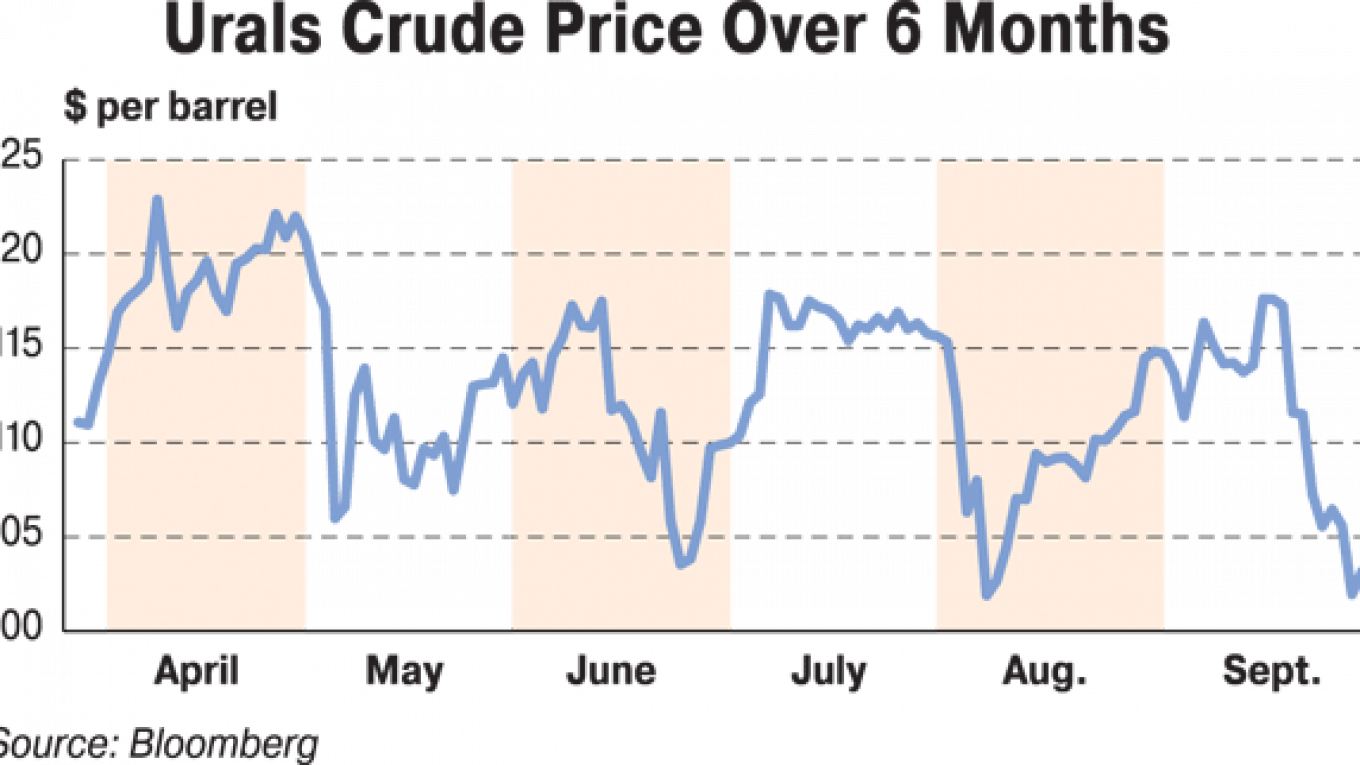Recent sharp falls have seen global oil prices reach levels not seen since early August when market turmoil and fears of an approaching recession followed Standard & Poor's credit downgrade of the United States.
Urals crude, the benchmark for Russian oil, closed Wednesday at $101.96 a barrel — its lowest level since Aug. 8 and a 13.3 percent drop from its $117.62 high just 10 days earlier.
Other global oil indexes also fell. WTI — traded on the New York Mercantile Exchange — fell $3.24 to $81.21 a barrel, and the price of Brent — traded on the IntercontinentalExchange —dropped $3.33 to $103.81 a barrel.
The falls were driven by the announcement of an increase in U.S. inventories, as well as ongoing worries about the sovereign debt crisis in Europe.
The price of oil climbed Thursday, paring some of the declines of previous days. At 6:30 p.m. Moscow time, Urals crude was $103.6 a barrel.
Global stocks also climbed Thursday after German Chancellor Angela Merkel won a key parliamentary vote to bolster the euro zone's rescue fund and U.S. growth was revised upward.
Russian equities followed international trends. In Moscow, MICEX closed up 2.17 percent at 1,407.71. RTS finished at 1389.14, a 1.59 percent rise.
But recent market gains cannot mask a general downward trend and negative sentiment. Slowing economies reduce the demand for oil, putting downward pressure on prices.
Citigroup cut their 2011 growth figure for the Russian economy for the second time Thursday, to 2.5 percent.
Although there are fears that a double-dip recession is just around the corner, experts have also speculated that the global economy may be entering a long period of stagnation.
Prior to his resignation on Monday as finance minister, Alexei Kudrin said last week that Russia may be embarking on a "lost decade" of slow economic growth.
Investment bank Goldman Sachs wrote in a research note Thursday that it is "far from clear whether enough has been done to jolt economic growth upwards and outside the zone where prolonged stagnation is a serious risk."
A Message from The Moscow Times:
Dear readers,
We are facing unprecedented challenges. Russia's Prosecutor General's Office has designated The Moscow Times as an "undesirable" organization, criminalizing our work and putting our staff at risk of prosecution. This follows our earlier unjust labeling as a "foreign agent."
These actions are direct attempts to silence independent journalism in Russia. The authorities claim our work "discredits the decisions of the Russian leadership." We see things differently: we strive to provide accurate, unbiased reporting on Russia.
We, the journalists of The Moscow Times, refuse to be silenced. But to continue our work, we need your help.
Your support, no matter how small, makes a world of difference. If you can, please support us monthly starting from just $2. It's quick to set up, and every contribution makes a significant impact.
By supporting The Moscow Times, you're defending open, independent journalism in the face of repression. Thank you for standing with us.
Remind me later.







